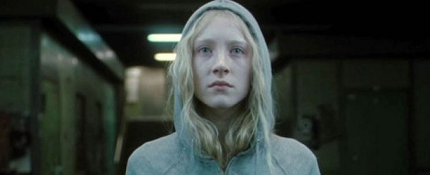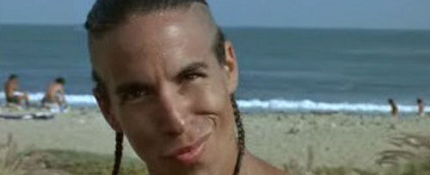 Guilt is all the rage this winter. For things you did, for things you don't remember doing, for things you remember doing but are running away from so fast that you run smack dab into a 15-year old boy. Then you have sex with him. A lot. You each get naked. A lot. Then you go on a bike ride. Or maybe you walk out of the ocean naked yet wearing a machine gun with a couple pals of yours. All I know is, whatever the hell you did, it wasn't really your idea, and now you feel like a turd about it. Lot o' good that'll do you.
Guilt is all the rage this winter. For things you did, for things you don't remember doing, for things you remember doing but are running away from so fast that you run smack dab into a 15-year old boy. Then you have sex with him. A lot. You each get naked. A lot. Then you go on a bike ride. Or maybe you walk out of the ocean naked yet wearing a machine gun with a couple pals of yours. All I know is, whatever the hell you did, it wasn't really your idea, and now you feel like a turd about it. Lot o' good that'll do you.I don't think there's ever been a weekend before where I saw two films that seemed different enough on the surface only to end up being about the same things. The Reader seems like a story about love and its effect on the life of one man, or maybe about the price of stubbornness and pride, or maybe about the price of sexing up teenagers...and it is all those things. But it's really about responsibility. And complicity. And nothing made that more evident than watching Waltz with Bashir.
The only difference is in the way that the guilty parties deal with their, um, guilt. The Reader's Hanna Schmitz has some mighty big skeletons in her closet. She doesn't talk about them and it's clear she doesn't like to think about them. She lives alone, works with people yet does a solitary job and generally minds her own business. But eventually, those skeletons are brought to the forefront. Though we're supposed to simultaneously feel bad for her and towards her, it's hard to feel remotely bad for someone who acts as if they were a third party to their own actions.
 Meanwhile, Ari Folman, the star/director/writer/producer of the gorgeous Waltz with Bashir, doesn't shirk the blame for the actions of his past - he can't, as he just plain doesn't remember them. Spurred on by hearing about the recurring dreams of a friend haunted by the ghosts of his past, Folman becomes aware and somewhat shocked that he can remember little of his own participation in the 1982 Lebanon War (and specifically the Sabra and Shatila massacre, where somewhere between a few hundred and a few thousand Palestinian men, women, and children were killed by Christian Phalangists as revenge for the assassination of their leader, Bashir Gemayel).
Meanwhile, Ari Folman, the star/director/writer/producer of the gorgeous Waltz with Bashir, doesn't shirk the blame for the actions of his past - he can't, as he just plain doesn't remember them. Spurred on by hearing about the recurring dreams of a friend haunted by the ghosts of his past, Folman becomes aware and somewhat shocked that he can remember little of his own participation in the 1982 Lebanon War (and specifically the Sabra and Shatila massacre, where somewhere between a few hundred and a few thousand Palestinian men, women, and children were killed by Christian Phalangists as revenge for the assassination of their leader, Bashir Gemayel).Like any good documentarian, he sets out on a quest for the answer, talking with friends that lead him to comrades of old that help him unlock the mystery of his past. It's like The DaVinci Code, only important and without puzzles. And an albino. What we're left with is a meta-quasi-documentary that might be too depressing and/or too obscure (after all, this is no Holocaust we're talking about here) were it not for its outstanding presentation.
Though it's not rotoscoped, the traditional/3-D/Flash-based animation of Waltz has that "moving still life" feel to it, and it's rich skies and dark tones are the perfect match to the mixture of punk, rock, electronic and local music featured on the soundtrack. With it's early '80s-setting (the war scenes, anyhow), Bashir feels, with good reason, like a companion piece to last year's (slightly superior) Persepolis, mixed with Richard Linklater's Waking Life. Good company.
Fletch's Film Ratings:
The Reader

"You seem a decent fellow. I hate to kill you."
Waltz with Bashir

"It's in the hole!"


























14 people have chosen wisely: on "Fletch's Film Review: The Reader and Waltz with Bashir"
Curious how much love The Reader has garnered from the Academy. I honestly hadn't heard anything about it prior to the nominations. Why is it so acclaimed? Kate Winslet doing naughty stuff?
It should be noted (and I've heard the grumblings already) that The Reader is a production of The Weinstein Company, aka Harvey Weinstein aka the same guy that's credited for getting Shakespeare in Love a Best Pic win over Saving Private Ryan.
In other words, campaigning.
I'm admittedly harsh with my overall grade due mostly to how I feel the film attempts to manipulate the audience's emotions via Winslet's character. It's not a bad movie - so far as I can tell, Stephen Daldry doesn't make bad movies. And I enjoyed a lot of it. However, I also was bothered by the repetitiveness of the first act (we get it - they had a lot of sex) and was left with a bad taste in my mouth, hence the low grade.
Though the Winslet naughty stuff probably didn't hurt.
Based on what I know of Weinstein, "campaigning" is code for "hung voters over balconies by the ankles."
Nice double-review. I was kind of curious about what was so wrong with The Reader when it ended up in so many critics' worst movies lists for 2008; but as it turns out, it wasn't that horrible. I am yet to write my own review for it but I don't even think it's a Holocaust movie (although Gervais's joke was still the best moment in the Golden Globe ceremony) but rather the touching story of a woman's pride, her shame, her guilt and her malice. Holocaust was merely a backdrop.
Bashir was great and I also agree that Persepolis was still superior (it worries me that I have been agreeing with a lot of stuff you had been writing about lately; am I going to turn out to be your long lost brother?) It is indeed too depressing, I only realized that when I tried to watch Tropic Thunder after the film and I simply could not. I guess that should be considered a good sign.
Would you agree that "Waltz With Bashir" scene was the best one in the film? I thought it was pure movie magic.
I missed the Gervais joke - what was it?
Don't worry about agreeing with me - I have great taste! ;)
Yeah, I'm thinking Waltz and Tropic couldn't be much more different in terms of tone while being pretty similar in terms of content (kind of). I don't think I'd want to watch them together, unless it was to wash the stink of one off in favor of the other.
(This ought to make you feel better) I actually don't agree with that statement about the best scene in Waltz. I liked the haunted feel of Ari's vision/memory that was shown a few times. Excellent colors, eerie content and I loved the blank looks on the women's faces and the 360 the camera did around him as he turned the corner. A brilliant "shot."
First the background info:
http://www.youtube.com/watch?v=aR2mBxumNe4&eurl=http://projectionbooth.blogspot.com/ (jump to the 3 minute mark on this one)
and the actual joke:
http://comedy.videosift.com/video/Ricky-Gervais-Presenting-at-Golden-Globes-Awards-2009
In fact the irony is so evident that you don't need the joke itself :)
Too funny - thanks for the links. In hindsight, I wish I had watched the Globes. I know they're always a better time than the Oscars, but for whatever reason, I didn't place too much importance on watching them...
I think it's good entertainment. Plus, you see all the important and not-so-important-but-cool-nonetheless faces of Hollywood together; so in my humble opinion, it's worth it (although Oscars is another such time so if you think once a year is enough, then I guess you should skip one of them)
Fletch - I saw "The Reader" yesterday, and I'm still trying to process my feelings about it. Mostly, it made me angry. I'll agree with you that it's well-made, but the emotional emphasis it places on Hannah and Michael's problems just felt wrong to me. I think you and I are of the same mind on this one.
Pat - what made you angry about it? I can understand that, but I'm interested to hear something specific. I didn't like the way that the other guards were painted as devils while Hanna was naive and dumbfounded by the results of her actions. She got off cheaply in the eyes of the film and I wasn't buying it. Sure, she might not have been the brightest bulb, but she was aware of the consequences of her actions, and if she really took issue, she could have done something about it. Wouldn't it have been better to be a martyr then and not later?
WARNING: CONTAINS SPOILERS
Fletch -
I'm going to post about his later today, but I think you and I are having essentailly the same reaction.
It's that whole "poor Hannah, the martyr" angle that was so offensive to me. And the fact that we're being maniplulated into crying over the shame of "poor Hannah's" illiteracy, when her true shame ought to be over her role in the deaths of so many innocent women. Given the horrors of the Holocaust, am I really supposed to shed tears over some prison guard who can't read and her emotionally constipated former boyfriend??? At least the camp survivor played by Lena Olin towards the end put everything into proper perspective. Hers was the only voice of true moral clarity in the entire film.
The lack of a certain moral clarity is central to The Reader. If it has a single virtue, it should be the fact that the story does not take the easy way of quickly condemning the woman with the crimes she obviously committed, nor the obviously controversial way of declaring her a hero/martyr. I think this ambivalence is to be valued, not scorned upon.
Now I wasn't a huge fan of the film either but despite its significant flaws, I think this is one of the rare things to it that worked properly.
Yes, Pat - we're entirely on the same page. I was nodding internally at the way Lena Olin's character felt and spoke. It wasn't disdain, it wasn't pity, it wasn't hate, but a simultaneous understanding of the complexity of the situation fused with an apathy towards Hanna's post-war frame of mind.
Anil, I think I agree with what you're saying, and that is that the filmmakers aren't outright telling you what to think about Hanna (something they didn't do with the other prison guards). However, given some time to assess the situation, it's clear where they fall and it feels a bit manipulative.
@Anil -
I appreciate what you're saying. And to be more clear, I don't mean to ask that the film pass easy judgment on Hanna (she is, at least, honest with the court about her actions, unlike her fellow guards). But ultimately, "The Reader," for me, puts on an undue amount of emotional weight not only on Hanna's inability to read, but on Michael's suffering and emotional deadness, which - compared to the horrors of the camps - are pretty small potatoes, really. And it's fairly perfunctory with regard to the true victims.
Maybe it's not accurate for me to say that Olin's character is the needed "voice of moral clarity" per se - but she certainly cuts through Michael's self-pitying bullshit in a refreshing and unexpected way.
Post a Comment